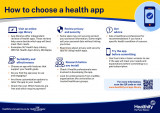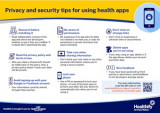If you're a frequent visitor to Healthify, why not share our site with a friend? Don't forget you can also browse Healthify without using your phone data.
Weight management apps
Weight management apps
- Weight management apps can encourage positive lifestyle changes to help maintain long-term weight control with diet and fitness.
- While they have the potential to help you form healthier habits and supportive behaviour changes, they must be used with caution. For example, avoid getting too fixated and becoming overly obsessed with specific numbers each day, especially with features like calorie counting and portion size.
- Read more about weight management apps and how to use them safely.

Weight management refers to the ongoing process of adopting long-term lifestyle habits to maintain a healthy body weight. It's not just about losing or gaining weight – it’s about achieving and sustaining a weight that supports your overall health and well-being. The basis of losing weight and keeping it off is to make healthy eating and lifestyle choices so the energy gained from your food and drink is balanced with the energy you use in daily activities. Weight loss is most successful when self-management, behavioural, and ongoing support strategies are used together. Read more about a healthy approach to weight loss and weight management tips.
There are a growing number of apps to assist with weight management. Apps can help you with:
- Healthy eating support such as understanding the nutritional makeup of your meals, managing portion size, focusing on whole foods and minimising processed foods.
- Physical activity guidance such as offering fitness plans, exercise guides, and tools to track movement and physical activity.
- Progress tracking to monitor your body weight, BMI, sleep, mood and other health metrics.
- Goal-setting to help you establish and work toward targets such as weight loss, calorie balance, hydration and physical activity.
- Social support enabling communication and support from others through online communities.
- Motivational tools such as reminders, rewards systems, or game-like features to keep you engaged.
- Personalised feedback through notifications or virtual sessions with health coaches.
While management apps can be helpful, there are safety concerns around their use, especially when used without professional guidance.
- Some apps have the potential to overemphasise calorie counting or weight tracking which can contribute to unhealthy obsessions with food and body image.
- Apps often contain general, generic recommendations which may not suit all people, especially those with specific medical needs or heath conditions such as diabetes, heart conditions or pregnancy. Without input from a healthcare provider, advice from the app may make some health conditions worse.
- Some apps may include inaccurate or unverified information and recommendations without clinical backing, which can be misleading or even harmful.
- Some users may become too dependent on apps to tell them what to eat, how much to exercise, or when to rest, instead of paying attention to how your body feels or getting advice from a healthcare provider. Being overly focused on weight management apps can lead to eating disorders and nutritional deficiencies.
Tips on how to use weight management apps safely
Here are some tips on how to use weight management apps safely.
- Avoid getting too fixated and overly obsessed with specific numbers each day, especially with features like calorie counting and portion size. This can lead you to lose sight of the overall nutrition picture.
- Although weight management apps may ask for your age, weight, height and gender, they don't have the ability to give you personalised diet advice that's best suited to your activity level and health needs. For personalised advice, it's best to seek professional advice from a dietitian or nutritionist. To find a registered dietitian in Aotearoa New Zealand, see find a dietitian(external link).
- While weight loss is the main motivator for some people to use weight management apps, be aware that your goals to reach a target weight within a target date must be realistic. Having unrealistic expectations can be harmful and lead to nutritional deficiencies and eating disorders. It's best to get professional advice about the best approach for you. Read more about a healthy approach to weight loss and weight management tips.
Before choosing an app, think about how it will benefit you and what you want it to be able to do.
- When selecting a nutrition app to download, it’s important to consider your goals and which features are most important to you.
- An app will only be helpful if you use it, so it needs to be something you like using and find easy to use. If you find the app difficult to use, or you don't like the imagery or look of it, or the language it uses, you may want to find another one that suits you better.
- Some apps offer a free trial followed by a paid subscription. Please read the terms and conditions carefully and make sure to cancel if you don't wish to subscribe and be charged on an ongoing basis.
- Check how your data is collected, stored and used in the app, including whether it’s shared with or sold to third parties.
- Apps designed outside of New Zealand may have links to resources overseas and therefore may not be relevant, and a time difference may impact accessing live tools.
- For more guidance on how to choose health apps, see how to choose a health app.
| App name | Description | Clinical score | |
|---|---|---|---|
|
|||
|
|||
|
|
|
||
|
Weight Loss Tracker – RecStyle app
|
|
||
|
|
|
||
|
|
|
||
References
- Rivera J, McPherson A, Hamilton J, Birken C, et al. Mobile Apps for Weight Management: A Scoping Review(external link). JMIR Mhealth Uhealth. 2016 Jul 26;4(3):e87.
|
Disclaimer: The NZ Health App Library is a free consumer service to help you decide whether a health app would be suitable for you. Our review process is independent. We have no relationship with the app developers or companies and no responsibility for the service they provide. This means that if you have an issue with one of the apps we have reviewed, you will need to contact the app developer or company directly. |
Factsheets – using health apps safely

How to choose a health app
Healthify He Puna Waiora, NZ

Privacy and security tips for using health apps
Healthify He Puna Waiora, NZ
Credits: Editorial team
Last reviewed:
Page last updated:






